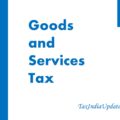FAQs on Job Works in GST Law
Q 1. What is job work?
Ans. Job work means undertaking any treatment or process by a person on goods belonging to another registered taxable person. The person who is treating or processing the goods belonging to other person is called ‘job worker’ and the person to whom the goods belongs is called ‘principal’.
This definition is much wider than the one given in Notification No. 214/86 – CE dated 23rd March, 1986. In the said notification, job work has been defined in such a manner so as to ensure that the activity of job work must amount to manufacture. Thus the definition of job work itself reflects the change in basic scheme of taxation relating to job work in the proposed GST regime.
Q 2. Whether goods sent by a taxable person to a job worker will be treated as supply and liable to GST? Why?
Ans. It will be treated as a supply as supply includes all forms of supply such as sale, transfer, etc. However, the registered taxable person (the principal), under intimation and subject to such conditions as may be prescribed send any inputs and/or capital goods, without payment of tax, to a job worker for job work and from there subsequently to another job worker(s) and shall either bring back such inputs/capital goods after completion of job work or otherwise within 1 year/3years of their being sent out or supply such inputs/capital goods after completion of job work or otherwise within 1 year / 3 years of their being sent out, from the place of business of a job worker on payment of tax within India or with or without payment of tax for export.
Q 3. Is a job worker required to take registration?
Ans. Yes, as job work is a service, the job worker would be required to obtain registration if his aggregate turnover exceeds the prescribed threshold.
Q 4. Whether the goods of principal directly supplied from the job worker’s premises will be included in the aggregate turnover of the job worker?
Ans. No. It will be included in the aggregate turnover of the principal. However, the value of goods or services used by the job worker for carrying out the job work will be included in the value of services supplied by the job worker.
Q 5. Can a principal send inputs and capital goods directly to the premises of job worker without bringing it to his premises?
Ans. Yes, the principal is allowed to do so. The input tax credit of tax paid on inputs or capital goods can also be availed by the principal in such a scenario. The inputs or capital goods must be received back within one year or three years respectively failing which the original transaction would be treated as supply and the principal would be liable to pay tax accordingly.
Q 6. Can the principal supply the goods directly from the premises of the job worker without bringing it back to his own premises?
Ans. Yes. But the principal should have declared the premises of an unregistered job worker as his additional place of business. If the job worker is a registered person then goods can be supplied directly from the premises of the job worker. The Commissioner may also notify goods in which case goods sent for job work can be directly supplied from the premises of the job worker.
Q 7. Under what circumstances can the principal directly supply goods from the premises of job worker without declaring the premises of job worker as his additional place of business?
Ans. The goods can be supplied directly from the place of business of job worker without declaring it as additional place of business in two circumstances namely where the job worker is a registered taxable person or where the principal is engaged in supply of such goods as may be notified by the Commissioner.
Q 8. What are the provisions concerning taking of ITC in respect of inputs/capital goods sent to a job worker?
Ans. Principal shall be entitled to take credit of taxes paid on inputs or capital goods sent to a job worker whether sent after receiving them at his place of business or even when such the inputs or capital goods are directly sent to a job worker without their being first brought to his place of business. However, the inputs or capital goods, after completion of job work, are required to be received back or supplied from job worker’s premises, as the case may be, within a period of one year or three years of their being sent out.
Q 9. What happens when the inputs or capital goods are not received back or supplied from the place of business of job worker within prescribed time period?
Ans. If the inputs or capital goods are not received back by the principal or are not supplied from the place of business of job worker within the prescribed time limit, it would be deemed that such inputs or capital goods had been supplied by the principal to the job worker on the day when the said inputs or capital goods were sent out by the principal (or on the date of receipt by the job worker where the inputs or capital goods were sent directly to the place of business of job worker). Thus the principal would be liable to pay tax accordingly.
Q 10. Some capital goods like jigs and fixtures are non-usable after their use and normally sold as scrap. What is the treatment o f such items in job work provisions?
Ans. The condition of bringing back capital goods within three years is not applicable to moulds, dies, jigs and fixtures or tools.
Q 11. What would be treatment of the waste and scrap generated during the job work?
Ans. The waste and scrap generated during the job work can be supplied by the job worker directly from his place of business, on payment of tax, if he is registered. If he is not registered, the same would be supplied by the principal on payment of tax.
Q 12. Whether intermediate goods can also be sent for job work?
Ans. Yes. The term inputs, for the purpose of job work, includes intermediate goods arising from any treatment or process carried out on the inputs by the principal or job worker.
Q 13. Who i s responsible for the maintenance of proper accounts related t o job work?
Ans. It is completely the responsibility of the principal to maintain proper accounts of job work related inputs and capital goods.
Q 14. Are the provisions of job work applicable to all categories of goods?
Ans. No. The provisions relating to job work are applicable only when registered taxable person intends to send taxable goods. In other words, these provisions are not applicable to exempted or non-taxable goods or when the sender is a person other than registered taxable person.
Q 15. Is it compulsory that job work provisions should be followed by the principal?
Ans. No. The principal can send the inputs or capital goods after payment of GST without following the special procedure. In such a case, the job-worker would take the input tax credit and supply back the processed goods (after completion of job-work) on payment of GST.
Q 16. Should job worker and principal be located in same State or Union territory?
Ans. No this is not necessary as provisions relating to job work have been adopted in the IGST Act as well as in UTGST Act and therefore job-worker and principal can be located either is same State or in same Union Territory or in different States or Union Territories.



![GST Bill 2017 [Bill No. 57 of 2017] has been Introduced in Loksabha](http://taxindiaupdates.in/wp-content/uploads/2015/05/Untitled1-120x120.png)
